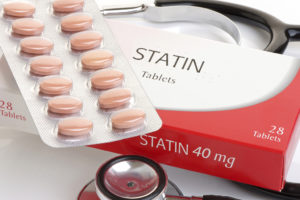
An international medical research team led by a self-described cholesterol skeptic thinks statin medications aren’t doing older adults any good.
Don’t believe the hype, says a Spectrum Health heart and vascular specialist, who sees significant holes in the team’s new study.
The study calls into question the importance of lowering low-density lipoprotein cholesterol—commonly known as “bad” cholesterol—in older adults. The researchers claim that LDL cholesterol levels have no effect on the life expectancy of people age 60 or older.
The authors also question the use of statin drugs in treating cholesterol, claiming “the benefits from statin treatment have been exaggerated.”
But Spectrum Health preventive cardiologist Thomas Boyden, MD, doesn’t agree with the study’s conclusions. Because the reviewers looked at just one type of research, cohort studies, their analysis is incomplete, he said.
“The thing that really stuck out to me the most was the lack of inclusion of randomized clinical trials,” he said, explaining that randomized trial data is “the most rigorous way we have of studying an association between two things.”
A big-picture view
It’s safe to say the study won’t have Dr. Boyden rethinking his approach to treating patients in the lipid clinic he runs at the Spectrum Health Fred and Lena Meijer Heart Center.
Instead, he’ll stick with the balanced approach he sees as key to cardiovascular disease prevention.
“I see lots of people over the age of 60 who have come to me for their cholesterol, and they’ve been told they should be treated, but when you look at the big picture, if they don’t have a lot of other risk factors, it may not need to be treated. It may just be something we watch.”
On the other hand, he said, if you “look at the entire picture and ask yourself what are things you can do to help change somebody’s risk, and if (treating cholesterol) is one of them, then I think it’s worth doing.”
In other words, doctors should base their treatments on all of a patient’s cardiovascular risk factors—age, cholesterol, blood pressure history, smoking history, diabetes history and family history—and not just cholesterol.
As for the value of cholesterol-lowering statins, Dr. Boyden remains an advocate.
“When you look at the literature, there are few drugs on the market that have the cardiovascular benefits in terms of death, heart attack and stroke that statins do,” he said.
While he acknowledges that statins aren’t right for everyone, he says that the hesitation some patients have is based on outdated information.
“Certainly in the early generation of statin medications there were lots of problems with muscle breakdown, muscle pain, liver enzyme abnormalities—but the newer generations of statins … are much safer medications,” he said.
For high-risk patients or those who already have heart disease, a statin medication is “the best way you can help control your risk, from a pharmaceutical perspective.”
Unanswered questions
The study in question was published in the online medical journal BJM Open. Its main author, Uffe Ravnskov, MD, is a Danish doctor who led a review of 19 published studies examining LDL as a risk factor for mortality in elderly people. The studies included more than 68,000 participants.
Dr. Boyden isn’t alone in his criticism of the research. The University of Oxford-based Centre for Evidence-Based Medicine has posted a detailed critique of the study.
Dr. Boyden looks forward to studies due out later this year that he expects will do a better job of answering questions about the role of LDL in heart disease. Those studies will report on the effectiveness of new medications that specifically work to get LDL cholesterol out of the bloodstream.
“I think that data will answer the question: Is LDL the major player in the development of atherosclerosis?” he said. Atherosclerosis is a hardening of the arteries.
Beyond medications, the best way to manage your health risk is what you do at home, Dr. Boyden said.
“I mean, there’s no substitute for a good diet and plenty of activity,” he said.
 /a>
/a>
 /a>
/a>
 /a>
/a>